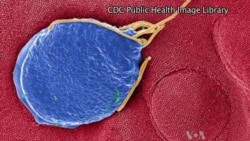BOULDER, COLORADO —
The human body harbors 100 trillion microbes, naturally occurring bacteria that can be helpful, even essential to our health. The microbes in our gut, or gastro-intestinal tract, help us digest our food and keep disease-causing bacteria at bay.
University of Colorado scientist Rob Knight is trying to learn what nutrients promote the beneficial ones, and understand how they interact.
“What this research could ultimately lead to is a world where no infectious disease goes undiagnosed,” he says.
To achieve that goal, Knight needs lots of microbes, from lots of people. To collect them, he’s launched an online campaign called the American Gut project.
People around the world are invited to take part. They are sent a questionnaire about their diet, their health and their use of antibiotics, along with sterile cotton swabs to rub on their tongue, or their hands or their forehead. Subjects even run the swabs over their used toilet paper so Knight can obtain samples of their personal microbes. Then, they return the packet to Knight’s lab.
Lab director, Chris Lauber, who says that most studies of the human microbiome focus on lab animals or people with a specific illness, is confident the open-ended nature of the American Gut Project will reveal new information.
"Anybody can enroll, and we don’t care what their disease state is and whether they’re on antibiotics," Lauber says. "We just want to know about them. And what microbes are in their gut.”
A growing body of research indicates it’s easy to kill off these gut microbes, through malnutrition, overuse of antibiotics, junk food and pollution. For example, in countries with traditional diets and less antibiotic use, allergies, asthma and autoimmune disease are less common than they are in Western countries.
Changes to gut microbes may even contribute to the worldwide epidemic of obesity and diabetes, which is why Second Genome CEO Peter DiLaura says his company is sponsoring sampling kits for 100 Type 2 diabetics.
“We’re really focused on working with Rob and the team at American Gut to understand in detail the microbial communities and the microbiome for this epidemic,” DiLaura says.
Second Genome hopes to develop pharmaceuticals and nutraceuticals for diabetes treatment based on what is discovered about the microbes in our guts.
But Knight says the immediate goal is to continue gathering important data, and he encourages everyone to participate in the sampling:
“You should participate if you have a fundamental interest in what microbes are living on and inside of your body," he says. "And also if you want to contribute to medical research that might someday provide useful information to you or to other people.”
Everyone who participates in the American Gut project will receive a summary of the microbes in their sample plus feedback about their foodlog and their health questionnaire.
They can also donate scholarships to sample the microbes of people in developing nations, and volunteer to be part of future research.
University of Colorado scientist Rob Knight is trying to learn what nutrients promote the beneficial ones, and understand how they interact.
“What this research could ultimately lead to is a world where no infectious disease goes undiagnosed,” he says.
To achieve that goal, Knight needs lots of microbes, from lots of people. To collect them, he’s launched an online campaign called the American Gut project.
People around the world are invited to take part. They are sent a questionnaire about their diet, their health and their use of antibiotics, along with sterile cotton swabs to rub on their tongue, or their hands or their forehead. Subjects even run the swabs over their used toilet paper so Knight can obtain samples of their personal microbes. Then, they return the packet to Knight’s lab.
Lab director, Chris Lauber, who says that most studies of the human microbiome focus on lab animals or people with a specific illness, is confident the open-ended nature of the American Gut Project will reveal new information.
"Anybody can enroll, and we don’t care what their disease state is and whether they’re on antibiotics," Lauber says. "We just want to know about them. And what microbes are in their gut.”
A growing body of research indicates it’s easy to kill off these gut microbes, through malnutrition, overuse of antibiotics, junk food and pollution. For example, in countries with traditional diets and less antibiotic use, allergies, asthma and autoimmune disease are less common than they are in Western countries.
Changes to gut microbes may even contribute to the worldwide epidemic of obesity and diabetes, which is why Second Genome CEO Peter DiLaura says his company is sponsoring sampling kits for 100 Type 2 diabetics.
“We’re really focused on working with Rob and the team at American Gut to understand in detail the microbial communities and the microbiome for this epidemic,” DiLaura says.
Second Genome hopes to develop pharmaceuticals and nutraceuticals for diabetes treatment based on what is discovered about the microbes in our guts.
But Knight says the immediate goal is to continue gathering important data, and he encourages everyone to participate in the sampling:
“You should participate if you have a fundamental interest in what microbes are living on and inside of your body," he says. "And also if you want to contribute to medical research that might someday provide useful information to you or to other people.”
Everyone who participates in the American Gut project will receive a summary of the microbes in their sample plus feedback about their foodlog and their health questionnaire.
They can also donate scholarships to sample the microbes of people in developing nations, and volunteer to be part of future research.





